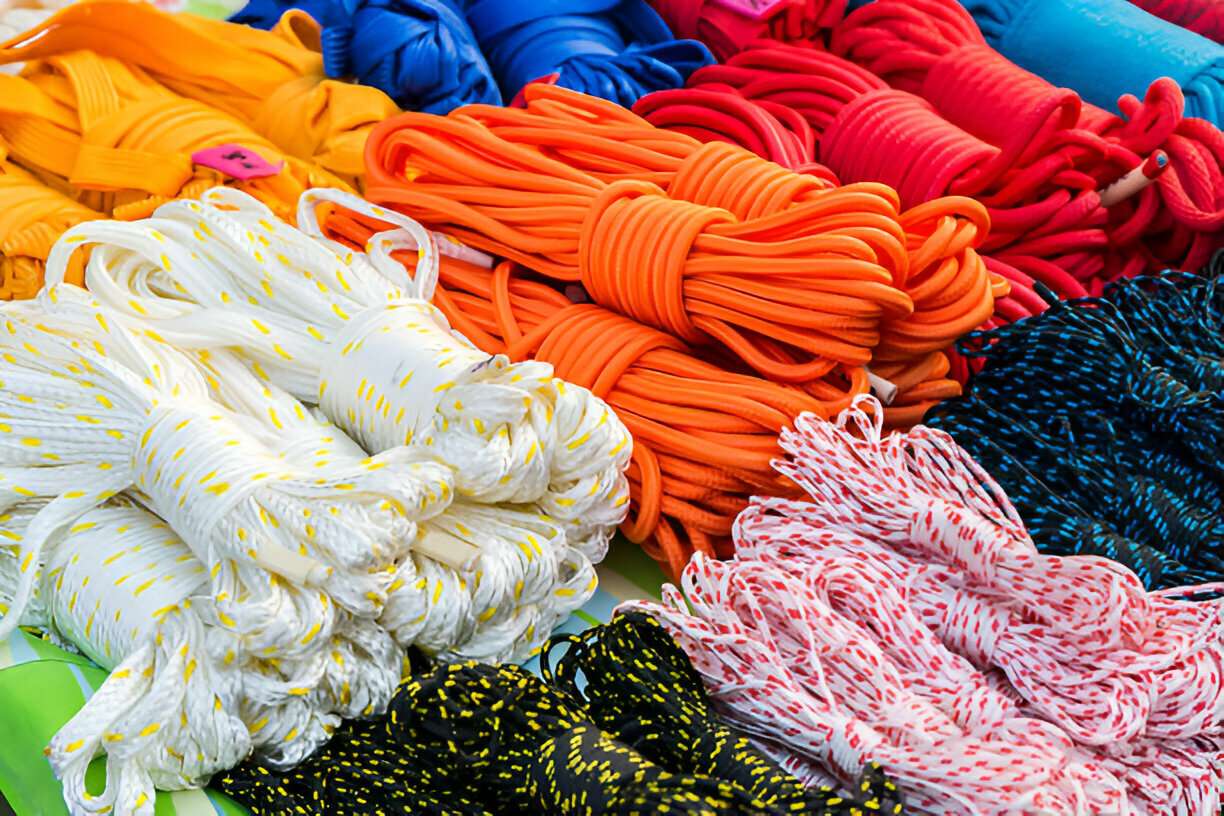

Polyester and nylon are two main ropes that are extensively used worldwide. Both present significant advantages over natural fiber ropes and have a wide range of applicability, but not equally.
Nylon, a fiber made from synthetic polymer and known for its strength and elasticity, is widely used to manufacture ropes. Nylon rope, tested for its performance in withstanding shock loads, is the best for dynamic sports requiring some elasticity aspects. Its resistance to abrasion and mildew stretches makes it suitable for various adaptable outdoor options that require flexibility.
Conversely, polyester, a synthetic fabric, has excellent shining as it is resistant to UV rays and moisture, which enhances its durability by reducing its susceptibility to shrinking and stretching. High strength, water resistance, and durability properties allow composites to perform exceptionally well in harsh marine conditions, where static performance in wet prevailing conditions is also essential.
Is nylon better than polyester? Nylon and polyester, in this aspect, are both capable of realizing their specific strengths and endurance. Nylon's elasticity gives it a significant advantage – now it's a good thing for absorbing the shocks, which is why it is often used in dynamic sports, including climbing and towing. Nylon will give way over time, but high-tenacity polyester holds on more, especially in harsh outdoor conditions. Thus, mooring lines and tent guide ropes, which need to stay strong over time, are mostly made of this kind of nylon yarn.
The open air is something you can never be sure of, and the toughness of your rope to face the elements is necessary for it to beat them all. Contrary to its admirable characteristics, nylon is attacked by ultraviolet light, which causes it to degrade with time. On the one hand, polyester maintains its look and shape as it features UV resistance, which means a longer lifespan under sunlight. Polyester is undoubtedly the winner for water resistance, considering that its absorption is quite low, and therefore, nothing can damage its strength and shape despite drenching.
Flexibility plays a key role in working with ropes, especially in activities where untying and knot-tying are often required. Nylon's excellent flexibility allows you to create and adjust knots easily, which traditional campers and climbers consider indispensable. Polyester, which is stiffer than other fibers, has the advantage of a firm grip, preferred in applications where knots must be held steadfastly over a long lifetime.
The safety factor is the main focus in all working environments with ropes, and the choice of materials significantly impacts this issue. In addition to having shock-absorbing properties, nylon is commonly used for dynamic activities such as climbing or rescue work, which is the place where the rope has to carry instant loads. It can be stretched a few times under stress, and the possibility of a snapback causing the failure is the major factor in such situations. In comparison, polyester's cut resistance and durability of the fabric are assets that guarantee the safety and longevity of use in such demanding applications as anchoring and rigging.
In addition to the costs, these two materials, nylon and polyester, offer great value, but they do it in different ways. Unlike polyester ropes, which are pricier, nylon ropes also promise high durability and performance, thus making them suitable replacements in dynamic settings, which would otherwise require frequent replacements. Typically, the price of polyester is lower, but they have a longer service life for static purposes and resist environmental conditions efficiently.
When discussing the difference between nylon and polyester, the following are some key points that distinguish them.
☑️ While choosing between nylon and polyester ropes is often influenced by the specifics of your activity, there are also some general aspects to consider. Durable nylon is a perfect choice for dynamic and high-impact activities, but its comfort and functionality cannot be compared to any other options. Contrary to polyester's hardness and weather resistance, it would enable it to satisfy static, long-term, outdoor, or marine applications.
☑️ Both materials provide unique features suitable for different environments and activities. For outdoor adventurers, professionals, or hobbyists, grasping these differences is the primary factor in making an informed choice that provides better outcomes in safety, efficiency, and joy.
☑️ Nylon Ropes are perfect for dynamic activities during which these parameters, such as flexibility and shock divergence, play a critical role. Their flexibility and resilience under load are tailor-made for conquering vertical challenges like climbing, rappelling, and rescue operations.
☑️ Polyester Ropes: Their strength, UV fastness, and very low stretch modernize them for random dynamical applications. The versatile polyesters stand out due to their reliability and durability in different climatic conditions, which make them handy for sailing, mooring, and upholding tents.
Ultimately, choosing between nylon and polyester ropes should result from carefully considering the pros and cons of the environment and activity you are participating in. When picking an appropriate rope, you ensure that your efforts will be productive and that you maintain your safety and the safety of the people around you.
Nylon normally has a higher strength than polyester. It has been proven awesome in terms of its tensile strength and is therefore highly preferred in applications with a high tolerance to tension.
Well, nylon does absorb water, but it is limited. In fact, nylon itself isn't water-absorbent on such a large scale as natural fibers such as cotton and wool are, but it starts to absorb moisture in humid conditions.
The stretchability of Nylon is somewhat acceptable. Stretchiness happens naturally in it more than in other types of fabrics, such as cotton and wool, since it is synthetically made with an elastic part that is also included.